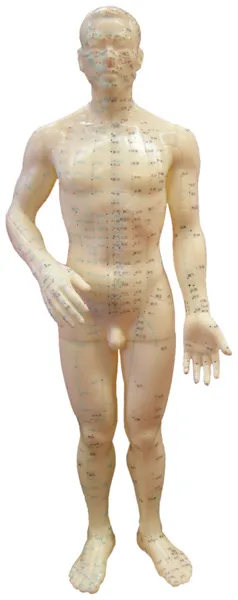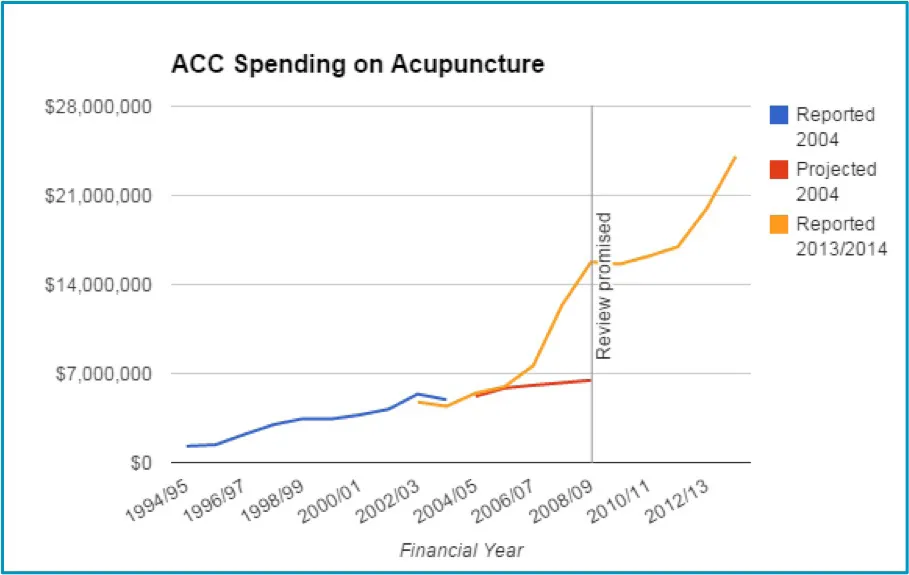ACC and Acupuncture
Mark Hanna - 1st February 2015

How much does the ACC spend on acupuncture? Mark Hanna investigates.
In 2014 a couple of Official Information Act (OIA) requests made by the Society for Science Based Healthcare to the Accident Compensation Corporation (ACC) uncovered information about how much they had spent on acupuncture treatments over the past decade ($120 million), as well as a more detailed breakdown of how much was spent on acupuncture for different categories of injury. Here are the top 5 categories by expenditure:
- Soft Tissue Injury $145 million
- Fracture / Dislocation $4.9 million
- Other $4.5 million
- Laceration, Puncture Wound $2 million
- Gradual Onset $1.18 million
Information released in parliament in 2004 also revealed how much money ACC spent on acupuncture in the decade from 1994-2004 ($31 million), as well as projections on how much they expected to spend on acupuncture from 2004- 2009 (< $7 million p.a.).
As you can see from the following chart, their projections turned out to be rather inaccurate, and ACC spending on acupuncture has been absolutely booming ($24 million in 2013/14):

In August, I submitted my own OIA request asking for copies of or links to all literature reviews regarding the effectiveness of acupuncture for any condition undertaken by ACC.
I was told that there are only two ACC literature reviews on the efficacy of acupuncture.
- Pragmatic Evidence Based Review: The efficacy of acupuncture in the management of musculoskeletal pain (2011)
- Brief Report: Effectiveness of acupuncture in selected mental health conditions (2014)
Here are the important parts of those reviews’ conclusions:
- The evidence for the effectiveness of acupuncture is most convincing for the treatment of chronic neck and shoulder pain. In terms of other injuries, the evidence is either inconclusive or insufficient.
- There is limited good quality evidence to conclusively determine acupuncture’s efficacy in treatment of mental health conditions such as Major Depressive Disorder, Dysthymia, Anxiety Disorder, Borderline Personality Disorder and Post Traumatic Stress Disorder.
When I went to write on this topic last year during Acupuncture Awareness Week, I found two more ACC literature reviews on the efficacy of acupuncture (as well as other treatments) on the ACC website:
- Managing Soft Tissue Ankle Injuries (2002)
- Traumatic Brain Injury: Diagnosis, Acute Management and Rehabilitation (2006)
On the topic of acupuncture, these reviews concluded: The evidence is either weak or absent for…acupuncture…current evidence does not support the use of acupuncture to treat people with [Traumatic Brain Injury].
Feeling rather frustrated that ACC’s response to my earlier request (which arrived less than two weeks before last year’s September election) was apparently false, I sent a more specific follow-up:
I would like to reiterate my request to be provided with copies of or links to all literature reviews regarding the effectiveness of acupuncture for any condition undertaken by ACC. For the sake of clarity, I would like to be explicit that this includes both reviews that looked at several treatment options including acupuncture, and reviews that were commissioned by ACC as well as those directly undertaken by ACC.
I hope anyone reading this would agree that this followup should absolutely not have been necessary, and all the information I was requesting here should have been provided in ACC’s response to my original request before they’d be breaking the law.
However, when ACC finally acknowledged my request over a week after having received it, they maintained that “the information provided to [me] on 3 September 2014 was complete” and that this was therefore a new, separate OIA request. Because of the break over summer, this gave them until the 20th of January to respond to my request.
At 4 o’clock on the afternoon on the 20th of January, I heard back from ACC with an answer that essentially felt like ‘find the information yourself, it’s online’. Instead of providing me with copies of, or links to, any reviews, they told me the name of one review commissioned by ACC and that it could be found online, and provided me with two links to pages on their website that listed all of their reviews.
Interestingly, although I don’t believe the 2011 review has been released except in response to an OIA request, it was not mentioned in ACC’s response and they told me that “ACC does not hold any other information that has not been published”.
Having taken some time to go through all the reviews found on the pages I was linked to, in order to find all those which mention acupuncture, I came up with the following list. As well as the review’s title and date where I could find one, I am quoting the relevant conclusions below.
- There is limited good quality evidence to conclusively determine acupuncture’s efficacy in treatment of mental health conditions such as Major Depressive Disorder, Dysthymia, Anxiety Disorder, Borderline Personality Disorder and Post Traumatic Stress Disorder.
Brief Report: Effectiveness of acupuncture in selected mental health conditions (2014)
- There is limited and heterogeneous evidence of effectiveness of acupuncture in depression… The evidence base [for anxiety] is small and varies greatly in terms of methodological rigour and comparability and the published literature is limited to very few good quality RCTs… There is limited evidence about the effectiveness of acupuncture in PTSD.
Considered Judgement Form: Effectiveness of acupuncture in selected mental health conditions (2014)
-
Unknown effectiveness (conflicting evidence of efficacy or absence of evidence; methodological concerns with research/insufficient data to date)
-
While acupuncture and ginkgo biloba have respectively been demonstrated in two small, separate randomised clinical trials to provide statistically significant effects on the frequency of [Primary Raynaud’s] attacks, use of these therapies is not recommended in these guidelines, on account of the absence of any further followup studies investigating these interventions.
Distal Upper Limb: Guidelines for Management of Some Common Musculoskeletal Disorders
- Evidence of no improvement in clinical outcomes
New Zealand Acute Low Back Pain Guide (2004)
- Evidence on the use of acupuncture for postTBI symptoms is scarce and inconsistent. Therefore, current evidence does not support the use of acupuncture to treat people with TBI.
Traumatic Brain Injury: Diagnosis, Acute Management and Rehabilitation (2006)
- No recommendations can be made about the use of acupuncture, chiropractic, osteopathy or other complementary therapies for the treatment of soft tissue knee injuries due to a lack of good quality evidence.
The Diagnosis and Management of Soft Tissue Knee Injuries: Internal Derangements (2003)
- There is some evidence that exercise and acupuncture, compared with exercise alone, may lead to better outcomes [for Frozen Shoulder].
The Diagnosis and Management of Soft Tissue Shoulder Injuries and Related Disorders (2004)
- Given the very small number of eligible RCTs identified, and their heterogeneity, it is not possible for this review to reach any 20 | NZ SKEPTIC Science-Based Healthcare strong conclusions about the effectiveness of acupuncture for the treatment and rehabilitation of musculoskeletal injuries.
Effectiveness of acupuncture for the treatment and rehabilitation of accident-related muskuloskeletal disorders: A systematic review of the literature (2002)
- The evidence for the effectiveness of acupuncture is most convincing for the treatment of chronic neck and shoulder pain. In terms of other injuries, the evidence is either inconclusive or insufficient.
Pragmatic Evidence Based Review: The efficacy of acupuncture in the management of musculoskeletal pain (2011)
Although they have told me so incorrectly in the past, I have ACC’s word that these are all the ACC literature reviews that evaluate acupuncture. As you can see, they are inconclusive or negative for all but a few specific conditions: frozen shoulder, chronic neck pain, chronic shoulder pain.
In 2014 ACC spent $30,000 on acupuncture to treat burns, $59,000 on acupuncture for concussion and brain injury, and $591,000 on acupuncture for fracture and dislocation. They apparently spent $22,592,000 on acupuncture for soft tissue injuries, but I find it highly unlikely that all of this money was used to treat frozen shoulder, chronic neck pain, and chronic shoulder pain.
ACC’s expenditure on acupuncture shows no sign of slowing. It grew 17% from 2011/12 to 2012/13, then a further 17% from 2012/13 to 2013/14, leaving the expenditure for 2013/14 at over $24 million. It’s certainly not a large part of ACC’s total expenditure ($1.3 billion in 2013/14), but it’s no small sum of money.
ACC is publicly funded. Publicly funded healthcare should be based on rigorous evidence. ACC does not appear to have evidence that would allow them to conclude that acupuncture is an effective treatment for any more than these conditions. It is well past time for ACC to reevaluate their expenditure on acupuncture. It should only be funded when used to treat conditions in a way that is supported by rigorous evidence, and that is certainly not the case currently.
I will end this article the same way as I have ended my previous writings on this topic, with my recommendations for how ACC should deal with this issue:
I think ACC needs to review its funding scheme for acupuncture. I think their approach to this should start with reviewing their Acupuncture Treatment Profiles document, ensuring that the only treatments contained within it are those supported by rigorous evidence, and purging pseudoscientific claims from it. If they find they need to undertake further reviews of the evidence for the use of acupuncture for particular indications, then they should do that before approving funding for it.
I think ACC should then only agree to pay for acupuncture treatments that are aligned with their Treatment Profiles document, which they should commit to reviewing at regular intervals to keep it in line with the latest evidence (I’m not sure what time interval would be most appropriate, and I understand that there is a cost involved in that work).
I’m not sure, but it’s possible some changes to legislation may be required before this becomes a reality, but if that’s the case those changes should happen. A government body should not be bound by law to fund healthcare that is not supported by evidence.
There’s one last thing I’d also like to see, although I really feel like this is a long shot. I think ACC should take an active role in discouraging healthcare practice based on the “pre-scientific notions” described in their 2011 review. I think they should do this by distancing themselves from those acupuncturists who promote it and who base their practice on it, by refusing to grant them status as registered ACC practitioners if they are found to rely on it.